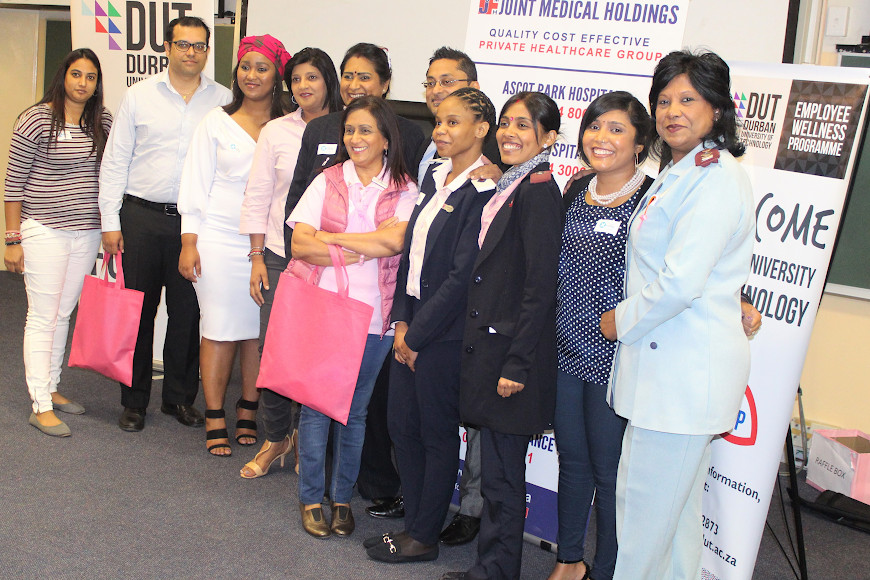Learning more about breast health and early detection formed an integral part of the Breast Cancer Workshop which took place at the DUT Steve Biko Library Complex on 31 October 2018.
The workshop, which was organised by the DUT Employee Assistance Programme (EAP) and the Gender Forum, also focused on the importance of breast self-examination and the mammogram procedure as well as the criteras to follow when doing a mammogram.
Speaking more on breast cancer was Dr Sanjeev Hariparsad, a specialist surgeon who specialises in breast, endocrine and soft tissue surgery. He runs the breast clinic at City Hospital on Tuesdays and is also involved in outreach programmes.
“Despite breast awareness in October and awareness programmes, many women remain ignorant about the importance of knowing your breast and being able to perform self-breast examinations. I am happy to be here to talk to you about breast health and breast cancer and what you learn here, you can go home and speak to your mother, friends and other people, educating them about this important subject,” he said.
Dr Hariparsad gave an overview of breast development and the importance of understanding who are at risk and how often one can perform self-breast examinations.
“It is vital to learn about our breasts and how to look after yourselves. Very often, breast cancer occurs to people who we love, so we need to empower them as well,” he stressed.
Delving further into the topic of who are at risk for breast cancer was Dr Zanele Nkosi, a specialist Clinical and Radiation Oncologist.
She spoke about the definition of breast cancer, saying breast cancer starts in the cells of the breast as a group of cancer cells that can then invade surrounding tissues or spread to other areas of the body.
She highlighted those who were at risk in getting breast cancer and that older women, family history, reproductive history and late menopause were the main risk factors. She also spoke on environmental and lifestyle risk factors such as poor diet, obesity, lack of physical activity, and having radiation therapy to the chest before the age of 30, can increase the risk for breast cancer. Dr Nkosi also added that taking combined hormone replacement therapy, as prescribed for menopause, can also increase one’s risk for breast cancer.
She spoke of the importance of breast cancer management which can take different approaches depending on physical and biological characteristics of the disease, as well as the age, over-all health and personal preferences of the patient. “Treatment types can be classified into local therapy and systemic treatment which can be local surgery, chemotherapy and hormone therapy. Early detection is important as it generally means detecting a breast cancer when the chances for cure are high and the need for chemotherapy and mastectomy are low,” she stressed.
Speaking more on the inherited type of breast cancer was Genetics nurse counsellor Namita Chubilall, who spoke more on knowing one’s family history so that a proper risk assessment can be done pre and post testing for breast cancer.
“Do genetic testing so you can plan your life and take care of yourself. Be empowered, be knowledgeable and talk, talk, talk,” she stressed.
Other speakers included Saiesha Juggoo from Jackpersad and Partners who stressed the importance of mammograms and breast cancer survivor Nirri Mothilall, who spoke on her experience of going through breast cancer and stressed the importance of early detection of the condition which can lead to effective treatment and a positive prognosis. She also emphasised that there were local support groups such as the Reach for Recovery Durban organisation with a unique focus on breast cancer support and one of the only organisations that provide a patient support service on a national basis. “It is built on a simple yet universal principle: that of one woman who has experienced breast cancer herself giving freely of her time and experience to assist and support another woman with breast cancer. Well-selected and trained volunteers, who each have experienced the breast cancer journey, render an emotional care and practical support programme to newly diagnosed breast cancer patients and their families,” she said.
All in all, the Breast Cancer workshop was well-received and breast examinations, glucose, BP and cholesterol testing were on hand for those who wanted to be checked.
Pictured: Attendees at the Breast Cancer Workshop.
Waheeda Peters


